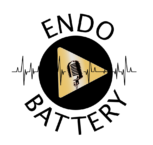
Send us a text with a question or thought on this episode
Registered dietitian Sarah Rae debunks common myths about soy and endometriosis, explaining why phytoestrogens may actually support—not harm—your health. Research suggests soy could even lower endometriosis risk!
In this episode:
✅ Soy as a source of calcium & lean protein
✅ No strong evidence that soy worsens endo
✅ Studies linking soy intake to lower endo risk
✅ How personal sensitivities & hidden ingredients impact reactions
Listen now & learn how to make informed choices for your body!
💬 Got questions? Submit them for future Quick Connect episodes via the link in the description, email contact@endobattery.com, or visit EndoBattery.com.
Website endobattery.com
0:00
Life moves fast and so should the answers to your biggest questions. Welcome to EndoBattery's Quick Connect, your direct line to expert insights Short, powerful and right to the point. You send in the questions, I bring in the experts and in just five minutes you get the knowledge you need. No long episodes, no extra time needed, and just remember expert opinions shared here are for general information and not for personalized medical advice. Always consult your provider for your case-specific guidance. Got a question? Send it in and let's quickly get you the answers. I'm your host, alana, and it's time to connect. Today we're joined by Sarah Ray from Pacific Northwest Endometriosis Nutrition. She's a registered dietitian specializing in endometriosis and fertility nutrition. She's here to cut through the noise and share real, evidence-based strategies to help you fuel your body without the confusion. Let's dive in. What role does soy play in estrogen?
Speaker 2:
1:16
production for endometriosis patients? Is it harmful to have soy or is that kind of a myth estrogen production? So the phytoestrogens which are in soy products generally are helpful. What I usually counsel patients on and I don't really see in our American diet. I have very few patients who are eating soy regularly in general, not because they're avoiding it, but we don't tend to drink soy milk. We don't tend to eat a lot of tofu or edamame. Having it a couple of times a week should be completely safe for endometriosis. For some people it does cause bloating and symptoms and if that's you, then don't eat it. But tofu is a really great source of calcium and healthy lean protein, which a lot of people with endometriosis also have high cholesterol and things like that. So I would say okay for soy.
Speaker 2:
2:05
There was a study done by Mumford that found no significant difference in phytoestrogen levels between women with and without endometriosis. So that suggested that phytoestrogen intake does not play a clear role in preventing or progressing endometriosis. There was another study done by I'm going to butcher it, but Yusuflu, who found that higher intake of levels of isoflavones, lignans and phytoestrogens correlated with endometriosis risk, so inversely. So the more soy that they consumed, the less endometriosis that there were. So there was less risk of developing endometriosis with soy consumption. And then there was another study that showed that the urine levels of soy products were inversely associated with it as well.
Speaker 2:
2:52
So I would say yes, soy should be safe for endometriosis. One of the things we might want to look at is using like non-GMO soy or organic and kind of paying attention to the sources of soy, and again, most people in real life are not eating like two or three serving, kind of paying attention to the sources of soy, and again, most people in real life are not eating like two or three servings of soy every single day. So anything we eat too much of we should, you know question. We also don't want to eat like seven servings of broccoli every single day. Anything too much is going to make you feel unwell, right?
Speaker 1:
3:22
I mean, I ran into that fear of like the soy for a really long time and it doesn't make me feel great so I don't eat it. But I think there are a lot of people that do well with it and don't have adverse reactions to it and you know have had excision and they don't, and they eat soy after and they're fine.
Speaker 2:
3:40
There's a lot of people in the population, the endometriosis population, that are sensitive to gluten. So like soy sauce contains gluten, but the soy may not be the issue. And then I have some patients that soy really bloats them and makes them feel unwell or, you know, might cause diarrhea. So it's just so hard because there's so many people who have endometriosis and every body is going to react differently to that thing and it may not actually be because of endo, but just your genetic history. What's going on with your microbiome, things like that. So, as with anything, it's individualized, but soy should be safe.
Speaker 1:
4:14
That's a wrap for this quick connect. I hope today's insights helped you move forward with more clarity and confidence. Do you have more questions? Keep them coming, send them in and I'll bring you the expert answers. You can send them in by using the link in the top of the description of this podcast episode or by emailing contact at endobatterycom or visiting the endobatterycom contact page. Until next time, keep feeling empowered through knowledge.
